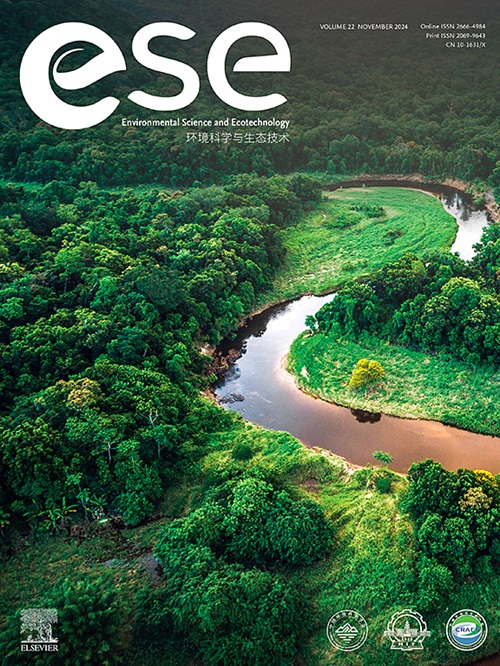Generative spatial artificial intelligence for sustainable smart cities: A pioneering large flow model for urban digital twin
IF 14.3
1区 环境科学与生态学
Q1 ENVIRONMENTAL SCIENCES
引用次数: 0
Abstract
Rapid urbanization, alongside escalating resource depletion and ecological degradation, underscores the critical need for innovative urban development solutions. In response, sustainable smart cities are increasingly turning to cutting-edge technologies—such as Generative Artificial Intelligence (GenAI), Foundation Models (FMs), and Urban Digital Twin (UDT) frameworks—to transform urban planning and design practices. These transformative tools provide advanced capabilities to analyze complex urban systems, optimize resource management, and enable evidence-based decision-making. Despite recent progress, research on integrating GenAI and FMs into UDT frameworks remains scant, leaving gaps in our ability to capture complex urban flows and multimodal dynamics essential to achieving environmental sustainability goals. Moreover, the lack of a robust theoretical foundation and real-world operationalization of these tools hampers comprehensive modeling and practical adoption. This study introduces a pioneering Large Flow Model (LFM), grounded in a robust foundational framework and designed with GenAI capabilities. It is specifically tailored for integration into UDT systems to enhance predictive analytics, adaptive learning, and complex data management functionalities. To validate its applicability and relevance, the Blue City Project in Lausanne City is examined as a case study, showcasing the ability of the LFM to effectively model and analyze urban flows—namely mobility, goods, energy, waste, materials, and biodiversity—critical to advancing environmental sustainability. This study highlights how the LFM addresses the spatial challenges inherent in current UDT frameworks. The LFM demonstrates its novelty in comprehensive urban modeling and analysis by completing impartial city data, estimating flow data in new locations, predicting the evolution of flow data, and offering a holistic understanding of urban dynamics and their interconnections. The model enhances decision-making processes, supports evidence-based planning and design, fosters integrated development strategies, and enables the development of more efficient, resilient, and sustainable urban environments. This research advances both the theoretical and practical dimensions of AI-driven, environmentally sustainable urban development by operationalizing GenAI and FMs within UDT frameworks. It provides sophisticated tools and valuable insights for urban planners, designers, policymakers, and researchers to address the complexities of modern cities and accelerate the transition towards sustainable urban futures.

可持续智慧城市的生成空间人工智能:城市数字孪生的开创性大流量模型
快速的城市化,以及不断加剧的资源枯竭和生态退化,凸显了对创新城市发展解决方案的迫切需要。为此,可持续智慧城市越来越多地转向尖端技术,如生成式人工智能(GenAI)、基础模型(FMs)和城市数字孪生(UDT)框架,以改变城市规划和设计实践。这些变革性工具提供了分析复杂城市系统、优化资源管理和实现循证决策的先进能力。尽管最近取得了进展,但将GenAI和FMs整合到UDT框架中的研究仍然很少,这使得我们在捕捉对实现环境可持续性目标至关重要的复杂城市流动和多模式动态的能力方面存在差距。此外,缺乏强大的理论基础和这些工具的实际操作,阻碍了全面建模和实际采用。本研究介绍了一个开创性的大流量模型(LFM),该模型建立在一个强大的基础框架上,并设计了GenAI功能。它是专门为集成到UDT系统而定制的,以增强预测分析、自适应学习和复杂的数据管理功能。为了验证其适用性和相关性,本文以洛桑市的蓝色城市项目为例进行了研究,展示了LFM有效建模和分析城市流动(即流动性、货物、能源、废物、材料和生物多样性)的能力,这些对促进环境可持续性至关重要。本研究强调了LFM如何解决当前UDT框架中固有的空间挑战。LFM通过完成公正的城市数据,估算新地点的流量数据,预测流量数据的演变,并提供对城市动态及其相互联系的整体理解,展示了其在综合城市建模和分析方面的新颖性。该模型加强了决策过程,支持基于证据的规划和设计,促进了综合发展战略,并促进了更高效、更有弹性和更可持续的城市环境的发展。本研究通过在UDT框架内实施GenAI和FMs,推进了人工智能驱动的环境可持续城市发展的理论和实践层面。它为城市规划者、设计师、政策制定者和研究人员提供了复杂的工具和宝贵的见解,以解决现代城市的复杂性,加速向可持续城市未来的过渡。
本文章由计算机程序翻译,如有差异,请以英文原文为准。
求助全文
约1分钟内获得全文
求助全文
来源期刊

Environmental Science and Ecotechnology
Multiple-
CiteScore
20.40
自引率
6.30%
发文量
11
审稿时长
18 days
期刊介绍:
Environmental Science & Ecotechnology (ESE) is an international, open-access journal publishing original research in environmental science, engineering, ecotechnology, and related fields. Authors publishing in ESE can immediately, permanently, and freely share their work. They have license options and retain copyright. Published by Elsevier, ESE is co-organized by the Chinese Society for Environmental Sciences, Harbin Institute of Technology, and the Chinese Research Academy of Environmental Sciences, under the supervision of the China Association for Science and Technology.
 求助内容:
求助内容: 应助结果提醒方式:
应助结果提醒方式:


